
2do Congreso Iberoamericano de Educación Comparada
2do Congreso Iberoamericano de Educación Comparada
7mo Encuentro Internacional de la Sociedad Brasileña de Educación Comparada
Convocatoria: http://educacaocomparada.com.br/
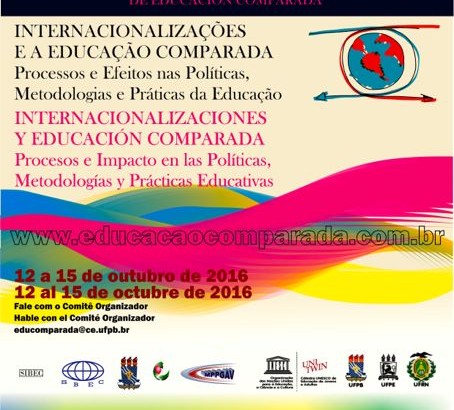

2do Congreso Iberoamericano de Educación Comparada
7mo Encuentro Internacional de la Sociedad Brasileña de Educación Comparada
Convocatoria: http://educacaocomparada.com.br/

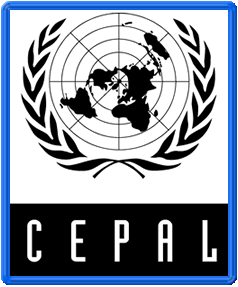
La canciller mexicana Claudia Ruiz Massieu, y la Secretaria Ejecutiva de la CEPAL, Alicia Bárcena, firmaron el acuerdo para el Trigésimo sexto período de sesiones del organismo, que se realizará del 23 al 27 de mayo.
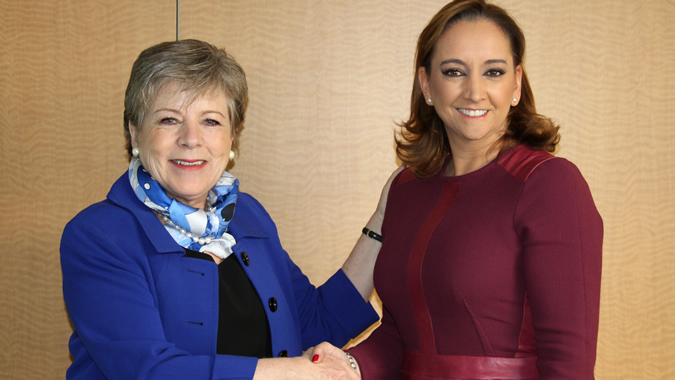
La Comisión Económica para América Latina y el Caribe (CEPAL) realizará su reunión bienal más importante en la Ciudad de México, del 23 al 27 de mayo de 2016, en donde presentará a sus 45 países miembros su reporte de actividades y propondrá a los gobiernos una reflexión sobre estrategias de desarrollo en el contexto de los compromisos de la Agenda 2030 y los Objetivos de Desarrollo Sostenible.
La Secretaria de Relaciones Exteriores mexicana, Claudia Ruiz Massieu, y la Secretaria Ejecutiva de la CEPAL, Alicia Bárcena, firmaron hoy el acuerdo en donde México se convierte en la sede para el Trigésimo sexto período de sesiones de este organismo de las Naciones Unidas.
“Para nuestro país es muy importante acoger el período de sesiones de la CEPAL y recibir a los representantes de toda la región para discutir temas de desarrollo e igualdad, especialmente de género”, aseguró Ruiz Massieu.
Bárcena señaló que en este período de sesiones se debatirá sobre el desarrollo económico, social y ambiental de la región sobre la base de un documento de posición elaborado por la CEPAL, de cara a la agenda de los Objetivos de Desarrollo Sostenible (ODS) aprobados por la Asamblea General de la ONU en septiembre de 2015. Este documento continúa en la senda de la llamada “trilogía de la igualdad” presentada por la Comisión en sus tres reuniones anteriores (2010, 2012 y 2014).
“Mantenemos a la igualdad en el centro de nuestras propuestas y con un enfoque de género en donde el papel de las mujeres latinoamericanas y caribeñas en la agenda de los ODS se visibilicen”, dijo la funcionaria de las Naciones Unidas. “Como mexicana es un honor que esta reunión se haga en mi país”, agregó Bárcena.
La Secretaria Ejecutiva también se reunió con el Presidente Enrique Peña Nieto, a quien le agradeció la invitación que hizo el gobierno de México a la CEPAL para ser sede del período de sesiones y le expresó su aprecio, ya que él será quien inaugure los trabajos del máximo órgano de gobierno de esta comisión regional de la ONU.
Durante su visita sostuvo además encuentros con las máximas autoridades de la Universidad Nacional Autónoma de México (UNAM) y el Instituto Nacional de Estadística y Geografía (INEGI), reuniones en las que estuvo acompañada por Antonio Prado, Secretario Ejecutivo Adjunto de la CEPAL y el Director de la Sede subregional en México, Hugo Beteta.
En la UNAM, el Rector Enrique Graue y el Secretario General, Leonardo Lomelí, acordaron con la CEPAL la publicación conjunta de una serie de estudios sobre desarrollo latinoamericano, así como elaborar una propuesta conjunta para una posible expedición oceanográfica entre la Antártida y el santuario de las ballenas en el Golfo de California en el marco de cooperación de la Alianza del Pacífico. También se propuso reforzar el intercambio académico y de becas para estudiantes latinoamericanos.
Bárcena se reunió también con Julio Santaella, Presidente del INEGI y con los vicepresidentes Félix Vélez y Rolando Ocampo. El Instituto actualmente preside la Conferencia Estadística de las Américas de la CEPAL (CEA-CEPAL) y participará activamente en el período de sesiones. Acordaron que el INEGI presentará sus experiencias sobre cooperación Sur-Sur, de el Caribe y Centroamérica, las estadísticas de género en América Latina y el Caribe, y la vinculación entre la estadística con la geografía en sus estudios.
La alta funcionaria de las Naciones Unidas finalizará sus actividades oficiales en México mañana sábado 13 de febrero, ocasión en la que participará en la recepción que el Estado mexicano ofrecerá al Papa Francisco en el Palacio Nacional.
El programa completo del Trigésimo sexto período de sesiones de la CEPAL, así como información general de la reunión, está disponible en el sitio web especial del encuentro:http://periododesesiones.cepal.org/36/es. Los periodistas que deseen acreditarse para cubrir la reunión podrán hacerlo también en ese sitio.
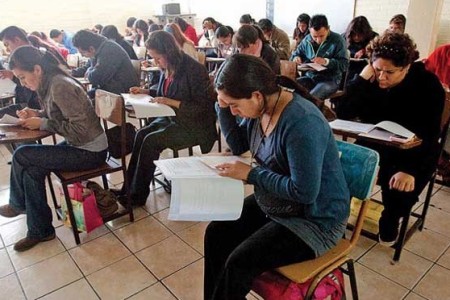
Manuel Gil Antón
En educación, 2016 será intenso: la SEP anunció iniciativas que merecen atención de todos, especialmente del magisterio, el actor ausente, a tres años aún, del diseño y ejecución de los cambios. Han sido concebidos como materia inerte, y moldeable, sobre la que las autoridades experimentan sin evidencia que asegure la idoneidad educativa de sus acciones. No ha prevalecido la racionalidad técnica y sus tiempos de maduración, sino la premura derivada de un conjunto de leyes mal elaboradas.
Se espera alguna iniciativa en torno a la Ley General de Educación, orientada por la idea de poner a la “escuela en el centro”. Ya van más de tres años en que esta reforma ha tenido, como punto central, a la evaluación como sea: un proceso que debería ser muy cuidado porque sus consecuencias son profundas, se ha usado para hacer variar a fondo la administración del sistema, mediante la modificación de las condiciones laborales de los y las profesoras: son, ya, empleados en condiciones de precariedad laboral, bajo amenaza constante, luego de ser desprestigiados sin medida.
Se anuncia también la propuesta del nuevo modelo educativo, hurtando de la crítica la noción de comunidades de aprendizaje, pues han operado bajo la idea que las escuelas serán “de calidad” merced a la adición simple de profesores idóneos al ingreso y satisfactorios en su desempeño. La propuesta del avance en el conocimiento, como producto de ambientes de aprendizaje complejos, no ha sido su horizonte: de haberlo sido, la valoración de las condiciones escolares para aprender sería otra.
A esta reforma se aferra el gobierno federal como clavo ardiente pues – al menos en apariencia – será la que tendrá mejores indicadores de “éxito” de todas las que derivaron del Pacto. Tiene la coartada que habrá de mostrar, si acaso, resultados a largo plazo (cuando ya no estén sus impulsores), de lo que deriva que festinen los medios empleados, sobre todo el sometimiento a la evaluación como mecanismo de control, ¡misión cumplida!, sin que haya posibilidad temporal de considerar, en efecto, su impacto en mejorar la educación.
Uno de los puntos cruciales del año será la publicación de los resultados de la evaluación para la permanencia en el servicio. Si se tratara de una evaluación diagnóstica para orientar las líneas de mejora del magisterio, estaríamos en un escenario interesante y prometedor. No obstante, y pese a que ese es el discurso oficial, los datos del proceso rebasan el diagnóstico: implican clasificar a los docentes, imputando a sus personas, no al resultado de la examinación, un adjetivo con gran carga simbólica: eres satisfactorio o no, y si lo eres, puedes ser bueno o destacado. De no serlo, el epíteto es rudo: no sirves. Además, de hacer pública la ubicación, de cada quien, en esas categorías, la distorsión en la comunidad escolar, así estratificada, y el reclamo de los padres para que atiendan a sus retoños los destacados, generará problemas.
Hay un factor adicional: la evaluación del desempeño a través de tres dimensiones (evidencias de trabajo, conocimientos y planeación argumentada) aplicada por la SEP, y aprobada por el INEE, no contó con los procesos previos indispensables para ser válida y confiable. Es un instrumento inseguro del que derivan consecuencias no triviales. Si va usted a recoger el resultado de un estudio de laboratorio, confía en que los sistemas y aparatos funcionen bien, de tal manera que lo que determine hacer el médico cuente con bases sólidas. Si el instrumental para el diagnóstico no se ha sometido a prueba, pero de todos modos se decide intervenir y hacer, por ejemplo, una cirugía, al revisarlo puede resultar fallido. Ya (mal) operado, ¿se conformaría con el clásico: usted perdone? ¿Le bastaría saber que así es porque “estamos aprendiendo”? No lo creo.
Profesor del Centro de Estudios Sociológicos de
El Colegio de México
@ManuelGilAnton
Publicado originalmente en El Universal de México
http://www.eluniversal.com.mx/
Fotografía publicada originalmente en Quadratin
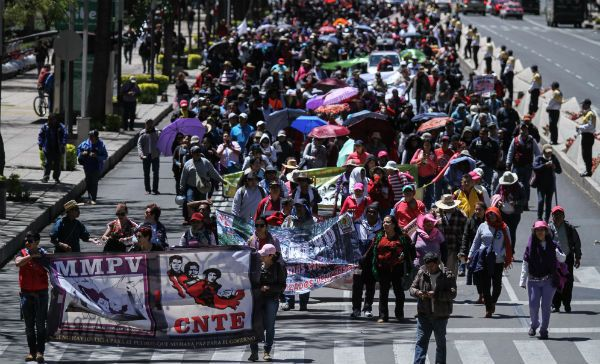
Ciudad de México— La Asamblea de la Coordinadora Nacional de Trabajadores de la Educación (CNTE) analiza la fecha de un nuevo paro nacional contra el cese de docentes que no acudieron a la evaluación educativa.
En la reunión, efectuada en la sede de la sección 9, en la Ciudad de México, unos 145 maestros debatieron sobre la ruta de acción para la defensa de los profesores.
En la mesa directiva estuvieron 17 representantes de los estados de Coahuila, Guerrero, Michoacán, Ciudad de México, Oaxaca, Chiapas y Zacatecas.
“Vamos a decidir qué hacer para defender a los notificados, los maestros que no presentaron la evaluación”, explicó Ángel Cruz, miembro de la sección 22 de la CNTE en Oaxaca.
Además, agregó en entrevista, se decidirá cuándo se realizará el paro de labores a nivel nacional.
“Es para expresar nuestro rechazo por los maestros cesados, y nuestro rechazo a la reforma educativa en general”, detalló.
Sin embargo, hasta el cierre de esta edición, después de un debate de más de nueve horas, la coordinadora todavía no tomaba una decisión sobre la fecha.
A principios de marzo, la Secretaría de Educación notificó el cese definitivo de 3 mil 360 docentes en todo el país por no presentar su evaluación.
El titular de la dependencia, Aurelio Nuño, informó que el despido será sin liquidación y se comprometió a realizar las sustituciones de los maestros se realizarán en el menor tiempo posible para no afectar a los alumnos.
“Se está aplicando la ley, quedan fuera del servicio sin ninguna responsabilidad para la autoridad”, dijo.
Fuente de la imagen destacada: http://www.24-horas.mx/maestros-de-la-cnte-alistan-paro-a-nivel-nacional/

www.lanacion.com.ar/Luciana Vazquez/13-03-2016/
Francisco fue el encargado de cerrar el foro mundial sobre educación en Dubai; premiaron a la maestra palestina Hanan Al Hroub.
Dubai.-«Artesanos de humanidad y constructores de la paz y el encuentro». Esas fueron las palabras del Papa Francisco para definir la tarea de los maestros en un mensaje grabado en video que cerró así la cuarta edicion del foro Global Education & Skills, organizado por la Fundación Varkey este domingo en Dubai.
El Papa también anunció que Dubai desarrollará los principios de Scholas Ocurrentes, que contó con representación en el GESF en la figura del argentino José María del Corral.
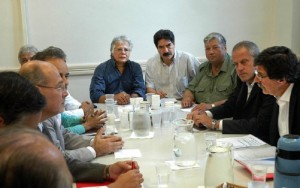
www.pagina12.com.ar/13-03-2016/universidades
LOS DOCENTES UNIVERSITARIOS PARAN Y EXIGEN LA APERTURA DE PARITARIAS
La Conadu y la Conadu Histórica anunciaron medidas de fuerza antes de fin de mes, en reclamo del inmediato inicio de las negociaciones paritarias. Adelantaron que pedirán incrementos salariales del 40 al 45 por ciento.
La mayoría de los gremios que agrupan a los profesores universitarios lanzaron paros y protestas para exigirle al Ministerio de Educación la apertura de las negociaciones paritarias. Las medidas de fuerza fueron anunciadas entre ayer y anteayer por las federaciones docentes Conadu y Conadu Histórica. El principal reclamo apunta a un incremento salarial superior al 40 por ciento. También hay denuncias puntuales de despidos de docentes interinos.
“Ya no podemos esperar más. El efecto de la inflación no se puede soslayar”, dijo a Página/12 Pedro Sanllorenti, secretario general de Conadu, la federación alineada con la CTA de los Argentinos. La mesa ejecutiva de Conadu resolvió “declarar el estado de alerta y movilización” y propuso un plan de acción que incluye un paro nacional para el próximo 30 de marzo.
“Lamentamos que el Gobierno haga oídos sordos al justo reclamo de los docentes –expresó la conducción de la federación–. Tras la devaluación y la escalada inflacionaria, hay una necesidad objetiva de abrir la paritaria: hemos presentado tres notas formales al ministro de Educación, Esteban Bullrich, e incluso al ministro de Hacienda, Alfonso Prat Gay, y hecho distintos reclamos públicos. Después de años de avances, en octubre de 2015 los universitarios habíamos recuperado el nivel histórico del poder adquisitivo del salario, que era de 1987. No estamos dispuestos a retroceder en 60 días las conquistas que nos llevaron años conseguir.” La federación realizará un plenario de autoridades el 15 de marzo, cuando también se hará una marcha al Palacio Sarmiento, y entonces se votará el plan de lucha propuesto por la mesa ejecutiva. Sanllorenti detalló que aspiran a “una recomposición salarial de al menos el 40 por ciento y una instancia de revisión del acuerdo hacia agosto”.
La Conadu Histórica, que integra la CTA Autónoma, realizó ayer un congreso extraordinario y aprobó dos huelgas de 48 horas antes de fin de mes: la primera el 16 y el 17, la segunda el 29 y el 30, fecha en que los docentes prevén instalar una carpa frente a la sede del Ministerio de Educación. “Exigimos la inmediata apertura de las paritarias, un aumento del 45 por ciento y la aplicación plena del convenio colectivo de trabajo”, explicó a este diario Luis Tiscornia, secretario general de la federación. A la vez, el congreso incluyó entre los reclamos al gobierno nacional un incremento del presupuesto universitario, la eliminación del Impuesto a las Ganancias sobre el salario y –un viejo pedido– la derogación de la Ley de Educación Superior.
Las asociaciones de base de Conadu Histórica acordaron confluir el 17 de marzo en una jornada contra la criminalización de la protesta y por la derogación del protocolo para el control de protestas públicas, una movilización convocada por las federaciones estudiantiles de Buenos Aires (FUBA), La Plata (FULP), Comahue (FUC) y Patagonia (FUP).
Los dirigentes sindicales de los docentes mantuvieron por lo menos dos encuentros con autoridades de la Secretaría de Políticas Universitarias –encabezada por el radical Albor Cantard, ex rector de la Universidad Nacional del Litoral– entre diciembre y enero. En principio, los profesores esperaban un llamado oficial para iniciar las paritarias a comienzos de este mes. “Pero hasta ahora no tuvimos ninguna respuesta”, dijo Tiscornia.
Además de las paritarias, otras dos cuestiones generan inquietud en los gremios del sector. Por un lado, si bien se trata de casos puntuales y no de algo masivo, como sí ha ocurrido en otras áreas de la administración pública, se registraron denuncias de despidos de docentes interinos (contratados, no concursados) en al menos dos universidades nacionales, las de Río Negro y de La Matanza. Y por otro lado, desde enero el Gobierno modificó la forma de calcular la asignación presupuestaria mensual correspondiente a cada universidad, por lo que en algunos casos se produjeron reducciones en las partidas destinadas a salarios y, en otros casos, atrasos en las partidas dirigidas a gastos de funcionamiento.
fuente de la imagen: http://ambitoeducativo.com/tag/docentes-universitarios/page/3/